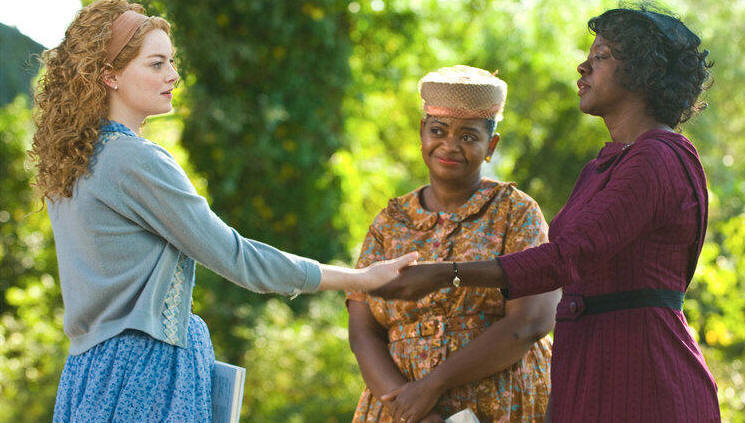MOVIE REVIEWS |
INTERVIEWS |
YOUTUBE |
NEWS
|
EDITORIALS | EVENTS |
AUDIO |
ESSAYS |
ARCHIVES |
CONTACT
|
PHOTOS |
COMING SOON|
EXAMINER.COM FILM ARTICLES
||HOME

Wednesday, August 10, 2011
MOVIE REVIEW
The Help
Storytelling, Maid To Order In 1963 Mississippi

Emma Stone as Skeeter, Octavia Spencer as Minny and Viola Davis as Aibilene in
Tate Taylor's drama "The Help".
Dale
Robinette/©DreamWorks LLC
by
Omar P.L. Moore/PopcornReel.com
 FOLLOW
FOLLOW
Wednesday,
August 10, 2011
Tate Taylor directs "The Help", based on Kathryn Stockett's fiction best-seller
about a group of black maids in 1963 Mississippi who take a stand against their
white female employers after years of mistreatment. The drama opened
across the U.S. today.
The maids, known thanklessly as "the help", endure racism and other indignities
in Mississippi at the hands of white housewives often ensconced in their hatreds
or trivial affairs to the point of neglecting their own children. When
insults, accusations, firings and humiliations accumulate frustrations among the
maids boil over. A white writer (Emma Stone, terrific here as Skeeter) who
responds to letters sent to a local newspaper, takes to writing and publishing
anonymous stories from the women who complain.
For all its well-meaning endeavor "The Help" is a predictable, squeaky-clean
entertainment that often feels tidy, polite but unruly. Characters stumble
upon and feel out each other in ways that are cautious for the sake of 21st
century audiences rather than honest for the film's time period. Mr.
Taylor occasionally puts race and racism at a safe distance, dramatizing it in
stereotype. Oddly "The Help" feels sanitized, stagey, more theatrical than
authentic. The director has several challenges, and has to balance issues
of race with variables that won't suppress audience turn-out but the scales are
tipped too much in the "safe" direction.
I haven't read Ms. Stockett's same-titled novel but understand it was very
closely followed for the film. If so, Mr. Taylor's lush, sunny effort
makes a mistake because "The Help" lacks focus when traversing several avenues.
When it becomes multiple stories about housewives, a writer, a writer's mother,
and a romance, it becomes a film altogether different from what its title
trumpets. As adaptations go, what's good for literary purposes isn't
always the best prescription for the big screen, and Mr. Taylor's showy film may
be its own biggest casualty. Maybe "Tapestry" (not Carole King's album)
would have been a better title.
The serious subject matter of "The Help" is diluted if not trivialized by
farcical proceedings which, though very funny on occasion, don't venture beyond
caricatured trappings. This truism is reflected in the work of Octavia
Spencer (as Minny) and Bryce Dallas Howard (as Hilly), work that, while
entertaining, is rooted in cardboard stereotype. Both performances are
stilted to serve as the film's chief polarizing figures. There are moments
of pain, truth and inspiration but these are as sparse and obligatory as they
are sincere. We also glimpse class differences as a subtext.
"The Help", which features
Viola Davis in a tentative performance as
Aibilene, the nominal title character but peripheral figure, implants racial
views in its most stocked types than in their nuanced counterparts. I
wondered if this was intended as a pre-emptive buttress against any audience
objection to the film's racial commentary being too fierce or genuine.
When one black maid speaks of her "fried chicken" and rolls her eyes in
exaggeration, it's more cringe-worthy than funny. Ms. Spencer's Minny
character is a safety valve for audiences to laugh with or at, comic relief and
nostalgic film figure more than touchstone for the film's weightier issues.
Granted, "The Help" has a sense of its time and history but there's
inconsistency in its flavor, tone and mood, all of which constantly shift and
disrupt the story. Strangely, I found the maids and their stories less
compelling than they should have been in a film that, at an exhausting two hours
and 17 minutes, is at least half an hour too long. "The Help" needed help
in the editing room. Had this ambitious, wandering film been pared down to
two stories and spent less time calculating its every move, it would have made
for a smoother, less mannered experience.
What Mr. Taylor's film does well however, and memorably, is weave a fine
tapestry of relationships between the women involved. At its heart are
good performances from Allison Janney as Ms. Stone's mother, and Ms. Spacek,
amusing and touching as an Alzheimer's-afflicted Southern matriarch. Ms.
Spacek manages to milk extended mileage out of the same punchline no less than
four times. Jessica Chastain showcases blonde "bimbo" parody in
exaggerated, physical full-throttle style as Celia, a 180-degree turn from her
work in "The
Tree Of Life", though it's a turn that while cute overstays its
welcome. Cicely Tyson wears pain and pride on her face in a small,
effective role, lending weight with a performance that belongs to another film.
Scattershot, Mr. Taylor's film, which he also wrote, is narrated by Ms. Davis,
then by someone else. The question I kept asking myself was, "Whose story
is this? Whose perspective? The maids? The writer's? The
housewives?" Therein lies the film's biggest problem: it wants to be all
things to all audiences, and in the process it spins out of control.
With: Aunjanue Ellis, Anna Camp, Ahna O'Reilly, Roslyn Ruff, Chris Lowell, Mike
Vogel, Mary Steenburgen.
"The Help" is
rated PG-13 by the Motion Picture
Association Of America for thematic material. The
film's running time is two hours and 17 minutes.
COPYRIGHT 2011. POPCORNREEL.COM. ALL RIGHTS RESERVED.  FOLLOW
FOLLOW
SUBSCRIBE TO THE POPCORN REEL MOVIE
REVIEWS RSS FEED

MOVIE REVIEWS |
INTERVIEWS |
YOUTUBE |
NEWS
|
EDITORIALS | EVENTS |
AUDIO |
ESSAYS |
ARCHIVES |
CONTACT
| PHOTOS |
COMING SOON|
EXAMINER.COM FILM ARTICLES
||HOME

 FOLLOW
TWEET
FOLLOW
TWEET FOLLOW
FOLLOW